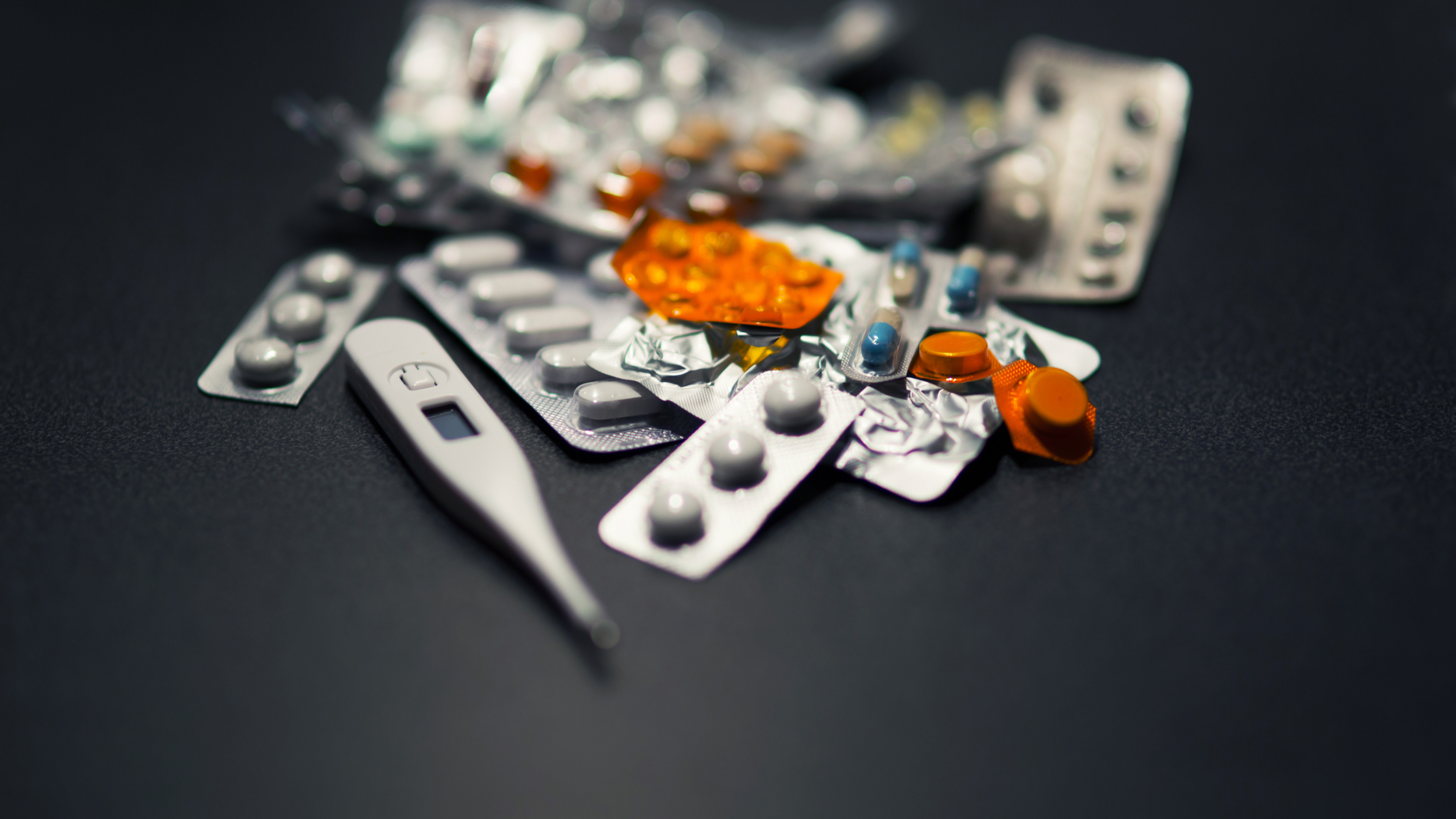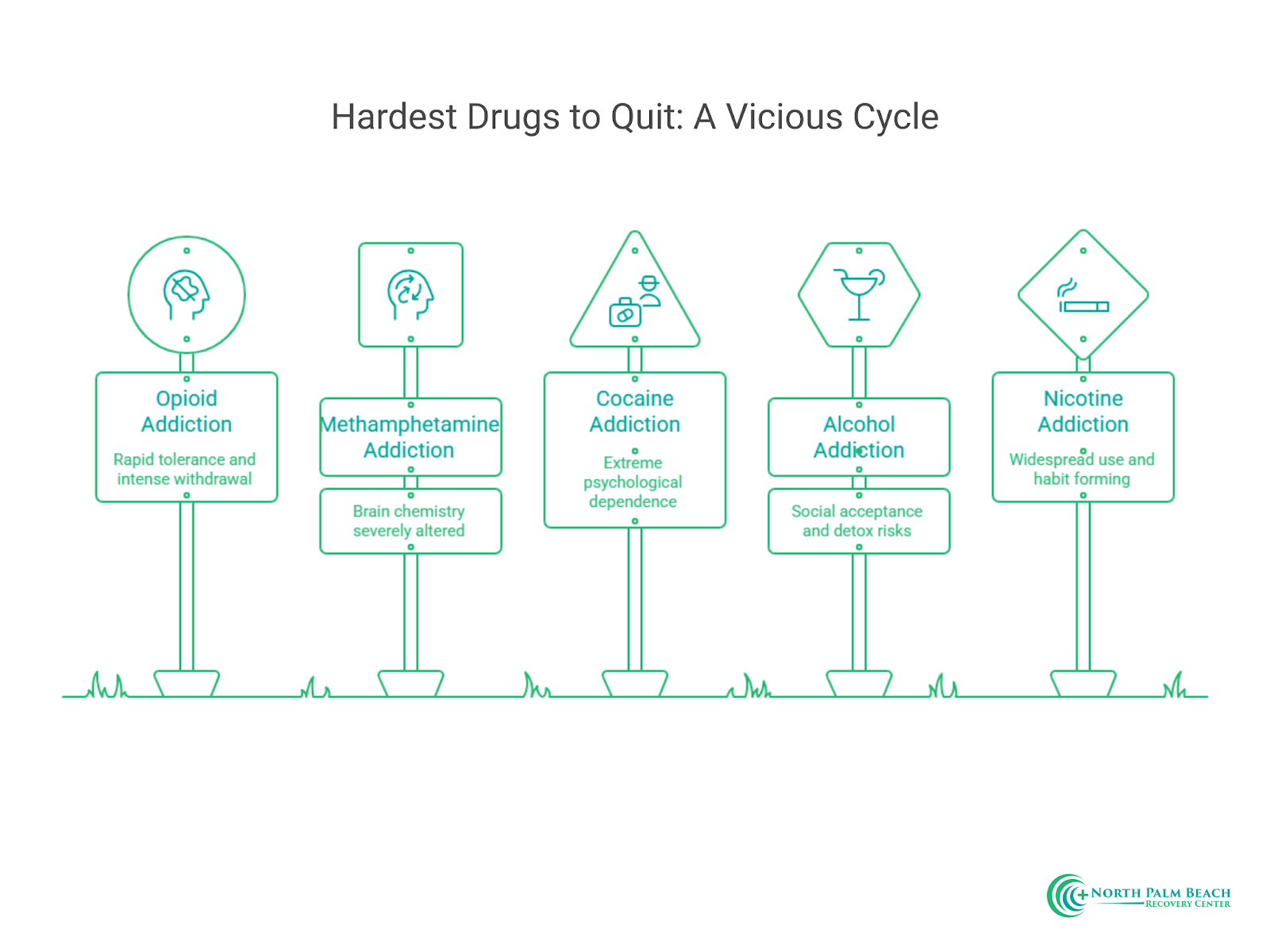
Some drugs grab hold of you so tight that getting free feels impossible without help. It's not just about willpower - these substances change your brain and body in ways that make quitting brutal. The difficulty depends on how the drug messes with your brain, what happens when you stop, and how much your mind depends on it.
When you're addicted, your brain gets rewired. The normal things that used to make you feel good don't work anymore. Your brain only knows how to feel okay with the drug in your system. But people do get clean, even from the worst addictions. North Palm Beach Recovery Center works with people who thought they'd never make it out. Their clinicians have master's degrees and know how to help each person based on what they're going through.
Several key factors determine why certain substances are more difficult to quit than others. Understanding these elements helps explain why some people struggle more with specific drugs and why professional treatment approaches vary based on the substance involved.

Your body adapts to having the drug around. When you take it away, you can get really sick - sometimes dangerously sick with seizures or heart problems. A lot of people keep using because they're terrified of what will happen if they stop.
Even after your body heals, your brain remembers how good the drug made you feel. Everyday stuff - a song, a street corner, stress at work - can suddenly make you crave the drug so bad it hurts. Many people started using to cope with trauma, depression, or just life being too hard.
Some drugs are easy to find or become part of your routine. You might be doing fine for months, then something reminds you of using and the craving hits like a truck.
While addiction severity varies by individual, certain substances consistently rank as the most challenging to overcome due to their effects on brain chemistry and withdrawal intensity. The following drugs are widely recognized by medical professionals as presenting the greatest barriers to recovery.

Heroin hits your brain's opioid system hard. Your tolerance shoots up fast, meaning you need more and more.
The withdrawal is hell. Within hours you're in agony - muscles screaming, throwing up everything, and wanting the drug so bad you can't think straight. It usually won't kill you, but it's so miserable that 9 out of 10 people go back to using within a year if they try to quit alone.
Florida's been destroyed by this crisis. Now fentanyl is everywhere, and it's 100 times stronger than heroin. Trying to detox from fentanyl without doctors is basically playing Russian roulette.
Meth burns through your brain's feel-good chemicals and damages the parts that help you enjoy life and stay motivated.
When you stop, everything goes dark. You can't feel happy about anything. You're exhausted all the time. Some people describe it like living in black and white when you used to see color. This can last for years.
The cravings stick around forever. You might be clean for a year, then smell something or see a certain person and suddenly you want meth so bad you can barely function.
Cocaine floods your brain with so much dopamine that when it stops, you crash below zero.
People get convinced they can't handle normal life without it. Since the high only lasts 30 minutes or so, users end up on these insane binges, desperately trying to avoid the crash.
After a binge, you feel so depressed and empty that cocaine seems like the only thing that will make you human again.
Alcohol might be legal, but it's one of the most dangerous drugs to quit. It's literally everywhere, and stopping cold turkey can kill you.
Society expects you to drink. Work events, dates, parties - everything revolves around alcohol. When you're trying to stay sober, you realize how much of social life involves booze. A lot of people in recovery end up lonely because they have to avoid so many situations.
Alcohol withdrawal can cause seizures, a condition called DTs where you become completely delirious, and heart problems that kill people. This isn't something you mess around with at home.
Alcohol withdrawal can cause seizures, a condition called DTs where you become completely delirious, and heart problems that kill people. This isn't something you mess around with at home.
Smokers tie cigarettes to everything - coffee, driving, stress, celebration. You end up with hundreds of triggers every day. The irritability and cravings can last for months.
Benzos and prescription painkillers are tricky because a doctor gave them to you for real problems.
People get hooked without realizing it, especially if they take them for months or years. Because they're "medicine," it's hard to admit you're addicted.
Benzo withdrawal can cause seizures and kill you. You absolutely need medical help to get off these safely.
People always say heroin, but honestly, it depends on you. Drugs that can kill you during withdrawal (alcohol, benzos, opioids) are usually the most dangerous. But drugs that mess with your head (meth, cocaine) can be just as impossible to beat. Your body, your mental health, who's supporting you, and whether you can get good treatment all matter more than which specific drug you're hooked on. The important thing is getting professional help no matter what you're struggling with.
Professional addiction treatment addresses the complex challenges of quitting difficult substances through medical supervision, evidence-based therapies, and structured support systems. At North Palm Beach Recovery Center, different levels of care provide tailored approaches based on individual needs and the specific substance involved.
Professional detox keeps you alive during withdrawal. Medical staff are there 24/7, giving you medications to ease symptoms and handling emergencies.
You get intense treatment 6-8 hours a day but sleep at home. Individual therapy, group sessions, and your family gets involved during those make-or-break first months.
You can keep working or taking care of responsibilities while getting help. They use therapies that actually work, like EMDR and CBT. You go 3-4 times a week for several hours.
Recovery doesn't end when you leave treatment. You need ongoing therapy, support groups, and a plan for when cravings hit. They teach you how to spot your triggers and handle them without using.
What is the hardest drug to quit?
There's no single answer. Heroin, meth, alcohol, and benzos are usually the worst because withdrawal is terrible and most people relapse.
What are the hardest drugs to quit besides opioids?
Meth, alcohol, cocaine, nicotine, and benzos are brutal because they change your brain chemistry, hook you mentally, or have dangerous withdrawal.
What's the hardest drug to get off of at home?
Alcohol and benzos can kill you during withdrawal. You need medical supervision.
Can you quit hard drugs without treatment?
Maybe, but your odds are terrible. Treatment gives you medical safety, therapies that work, and ongoing support.
How long does it take to recover from addiction?
It's lifelong, but you start stabilizing after 30-90 days. The worst physical symptoms end in days or weeks. Healing mentally takes months or years.
You can beat addiction with the right help. North Palm Beach Recovery Center has experienced clinicians who use proven methods - medical detox, Intensive Outpatient Programs, and ongoing support. They work with most insurance and verify coverage for free. If you or someone you love is struggling with addiction, call North Palm Beach Recovery Center in West Palm Beach today. Check your insurance and start getting your life back.
Lorem ipsum dolor sit amet consectetur adipiscing eli mattis sit phasellus mollis sit aliquam sit nullam neque ultrices.